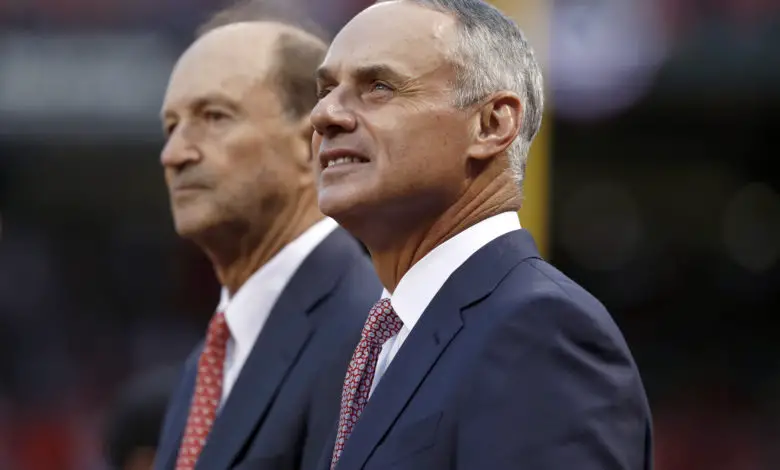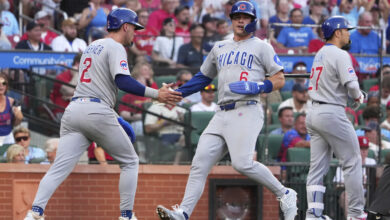
Cards Chairman Bill DeWitt Jr. Echoes Tom Ricketts’ Claim That MLB Ownership ‘Isn’t Very Profitable’
Based on their words and actions over the past few weeks, MLB owners apparently believe we commoners are unable to obtain and digest information. How else do you explain their repeated attempts to offer players the same deal with different packaging, or the idea that theirs is not a money-making enterprise?
Tom Ricketts lamented the potential for “biblical” losses when he spoke with ESPN’s Jesse Rogers, presumably while building an ark with which to save his family from a flood of bad PR. But to hear him explain it, the massive boat he’s built in and around Wrigley Field is almost too leaky to be deemed seaworthy.
“The league itself does not make a lot of cash,” Ricketts shared with Jesse Rogers. “I think there is a perception that we hoard cash and we take money out and it’s all sitting in a pile we’ve collected over the years. Well, it isn’t. Because no one anticipated a pandemic. No one expects to have to draw down on the reserves from the past. Every team has to figure out a way to plug the hole.”
Perhaps not wanting to be left on the wrong side of the rivalry, Cardinals chairman Bill DeWitt echoed his colleague’s sentiments during a Tuesday interview with Frank Cusumano of 590 The Fan. DeWitt expressed confidence that the game will bounce back even stronger after a shortened 2020 season, but the players first need to stop clinging to their “ridiculous proposal” and realize that they should just settle for what they can get.
“Well, take a look at the deal the players have and don’t think for a minute that the reduced payroll added money in the pockets of the owners because it didn’t. If you look at the growth in the personnel of franchises, we’ve grown — this is non-players — in the last six years from 240 employees to 400.
“A lot more is put into training, conditioning, promotional work, front office, analytics. It’s a bit of a zero-sum game.”
He went on to say that MLB players have by far the best deal in all of professional sports, yet he acknowledged that other leagues are coming back more quickly because they’re aligned with their players. Does that seem like a bit of a contradiction to you, or am I the only one who finds it odd? DeWitt clarified that it was due to other leagues participating in a revenue-sharing plan, so there’s that.
Major League Baseball has set new revenue records for something like 16 consecutive seasons, but team owners will tell you it hasn’t actually helped their bottom lines. The way Ricketts and DeWitt make it sound, owning a team is pretty much like operating a struggling mom-and-pop shop that just barely breaks even at the end of the day.
“The industry isn’t very profitable, to be quite honest,” DeWitt claimed. “And I think [the players] understand that, but they think the owners are hiding profits and this and that. You know, there’s been a little bit of a distrust there.”
In keeping with the whole labor of love notion, DeWitt said Ballpark Village adjacent to Busch Stadium is not “a real profit opportunity” and serves a more altruistic purpose for the overall betterment of the city. You know, because most teams would drop a quarter-billion into a major development just to be a good neighbor. Wait a minute, maybe baseball isn’t “profitable” because all those revenues are simply being dumped back into development and other asset growth.
That would explain why all these owners are suddenly pinching pennies rather than getting the season started again. Gee, I wonder if the DeWitt would have fewer reservations about paying players if he hadn’t just bought Eva Longoria’s Hollywood Hills compound for $8.25 million. To be fair, the buyer was an LLC tied to DeWitt, who has several business interests beyond the Cardinals. But isn’t that really the crux of the players’ issues?
These owners are able to pull off all kinds of clever accounting to make it look like they’re going to go broke if they meet the players’ outrageous demands, like being paid their full per-game salaries. Money is allocated strategically, which is generally how it works when you’re dealing with sums that can top 10 figures, so actual profit is far more understated that it might otherwise be.
Here’s what you really need to ask yourself when you hear these guys talking about baseball not really making money: If owning a team wasn’t profitable, why the hell would billionaires keep buying them? You’d think word would have spread around the old boys club by now that it’s a bad business that should be avoided at all costs. Or maybe we just shouldn’t take what they’re saying as gospel.

